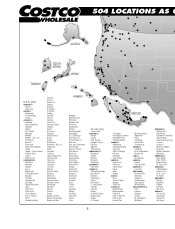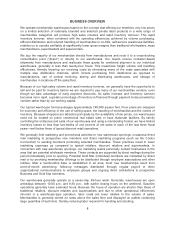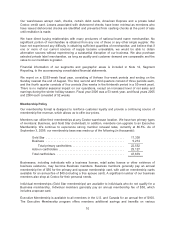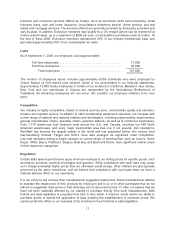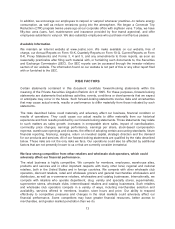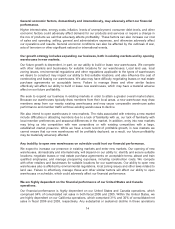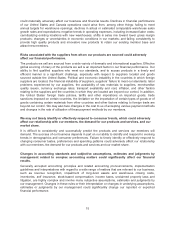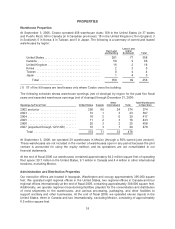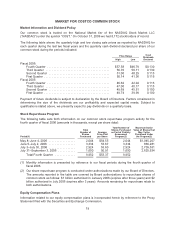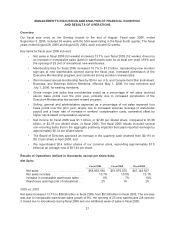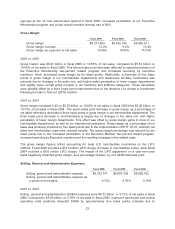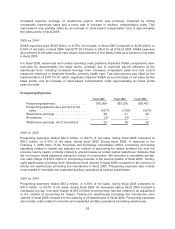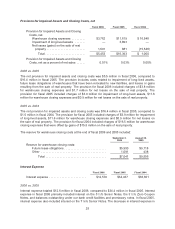Costco 2006 Annual Report Download - page 17
Download and view the complete annual report
Please find page 17 of the 2006 Costco annual report below. You can navigate through the pages in the report by either clicking on the pages listed below, or by using the keyword search tool below to find specific information within the annual report.could materially adversely affect our business and financial results. Declines in financial performance
of our United States and Canada operations could arise from, among other things: failing to meet
annual targets for warehouse openings; declines in actual or estimated comparable warehouse sales
growth rates and expectations; negative trends in operating expenses, including increased labor costs;
cannibalizing existing locations with new warehouses; shifts in sales mix toward lower gross margin
products; changes or uncertainties in economic conditions in our markets; and failing consistently to
provide high quality products and innovative new products to retain our existing member base and
attract new members.
Risks associated with the suppliers from whom our products are sourced could adversely
affect our financial performance.
The products we sell are sourced from a wide variety of domestic and international suppliers. Effective
global sourcing of many of the products we sell is an important factor in our financial performance. Our
ability to find qualified suppliers who meet our standards, and to access products in a timely and
efficient manner is a significant challenge, especially with respect to suppliers located and goods
sourced outside the United States. Political and economic instability in the countries in which foreign
suppliers are located, the financial instability of suppliers, suppliers’ failure to meet our standards, labor
problems experienced by our suppliers, the availability of raw materials to suppliers, merchandise
quality issues, currency exchange rates, transport availability and cost, inflation, and other factors
relating to the suppliers and the countries in which they are located are beyond our control. In addition,
the United States’ foreign trade policies, tariffs and other impositions on imported goods, trade
sanctions imposed on certain countries, the limitation on the importation of certain types of goods or of
goods containing certain materials from other countries and other factors relating to foreign trade are
beyond our control. We may also face changes in the cost to us of accepting various payment methods
and changes in the rate of utilization of these payment methods by our members.
We may not timely identify or effectively respond to consumer trends, which could adversely
affect our relationship with our members, the demand for our products and services, and our
market share.
It is difficult to consistently and successfully predict the products and services our members will
demand. The success of our business depends in part on our ability to identify and respond to evolving
trends in demographics and consumer preferences. Failure to timely identify or effectively respond to
changing consumer tastes, preferences and spending patterns could adversely affect our relationship
with our members, the demand for our products and services and our market share.
Changes in accounting standards and subjective assumptions, estimates and judgments by
management related to complex accounting matters could significantly affect our financial
results.
Generally accepted accounting principles and related accounting pronouncements, implementation
guidelines and interpretations with regard to a wide range of matters that are relevant to our business,
such as revenue recognition, impairment of long-lived assets and warehouse closing costs,
inventories, self insurance, stock-based compensation, income taxes, unclaimed property laws and
litigation, are highly complex and involve many subjective assumptions, estimates and judgments by
our management. Changes in these rules or their interpretation or changes in underlying assumptions,
estimates or judgments by our management could significantly change our reported or expected
financial performance.
15



